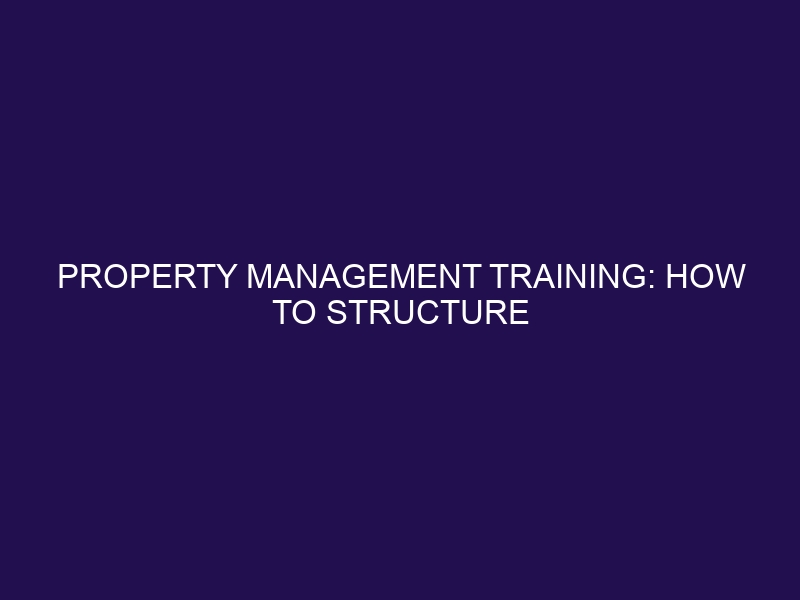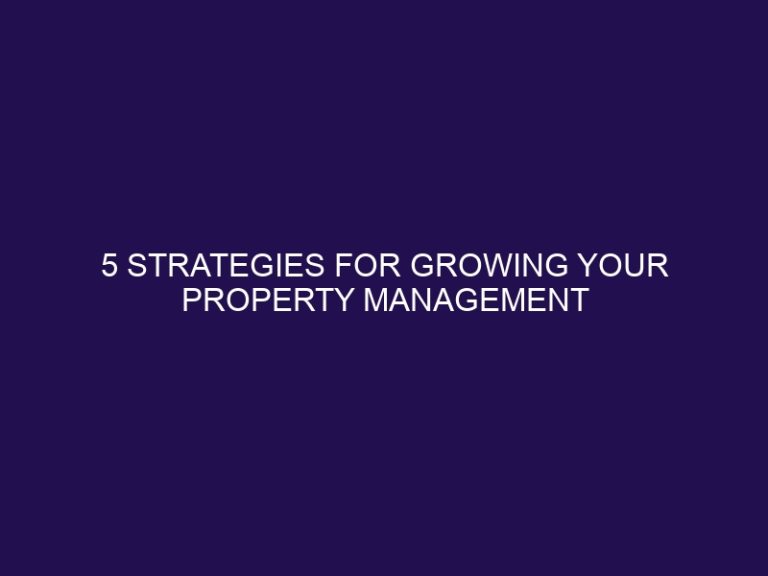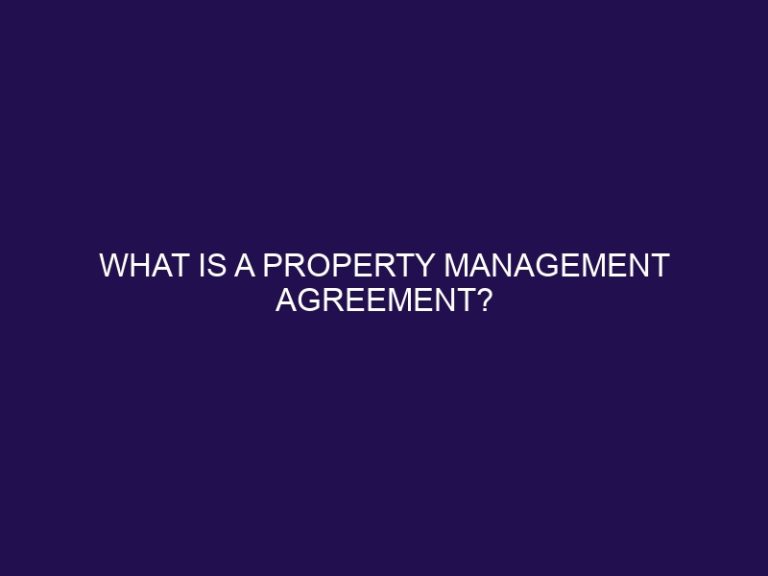Property Management Training: How to Structure Your Staff
Property management training is a crucial aspect of successfully managing properties and ensuring the efficient functioning of your staff. It involves educating and equipping your team with the necessary skills and knowledge to handle various responsibilities associated with property management.
Structuring your staff is of paramount importance in property management as it establishes clear roles, responsibilities, and reporting lines within the organization. A well-structured staff ensures a smooth workflow, effective communication, and improved productivity.
There are several benefits to having a well-structured staff, including enhanced teamwork, increased efficiency, improved customer service, and better coordination between different departments. On the other hand, poor staff structure can lead to confusion, errors, and delay in operations, which can negatively impact tenant satisfaction and overall profitability.
To structure your property management staff effectively, you need to establish clear roles and responsibilities for each team member, create transparent reporting lines, establish effective communication channels, and implement training and development programs to enhance their skills and knowledge.
Creating staff accountability is another vital aspect of property management. This involves setting clear goals and targets, conducting regular performance evaluations, and providing appropriate feedback and recognition to motivate and inspire your team members.
However, in any organization, challenges with staff can arise. This may include conflicts among team members, dealing with underperforming staff, or addressing issues related to staff motivation and engagement. It is essential to have strategies in place to handle these challenges effectively, such as conflict resolution techniques, performance improvement plans, and initiatives to boost staff motivation and engagement.
What is Property Management Training?
Property management training refers to the process of educating individuals on what property management training is, and how to effectively manage properties, whether residential or commercial. It involves equipping them with the necessary skills and knowledge to handle various tasks such as leasing, maintenance, accounting, and tenant relations. This training covers topics like property laws and regulations, marketing strategies, financial management, and communication skills. By undergoing property management training, individuals can develop the expertise needed to excel in this field, ensuring that properties are well-maintained and profitable.
True story: Jane, a property manager, attended comprehensive property management training to understand what property management training is. She learned valuable techniques for resolving tenant conflicts and increasing tenant satisfaction. As a result, Jane was able to cultivate positive relationships with her tenants, leading to reduced turnover rates and increased occupancy rates in the properties she managed. Her success in managing properties was attributed to her dedication to ongoing property management training, which enabled her to stay updated with current industry practices and deliver exceptional service to both property owners and tenants.
Why is Structuring Your Staff Important in Property Management?
“`
Why is Structuring Your Staff Important in Property Management?
In property management, the importance of structuring your staff cannot be overstated. It is crucial for ensuring efficiency, productivity, and overall success of the business. By organizing your team effectively, you can achieve clear role delineation, enable effective communication, and optimize the use of resources. This leads to more streamlined processes, reduces duplication of work, and fosters collaboration among team members.
Moreover, structuring your staff contributes to the creation of a positive work environment, boosts employee morale, and enhances customer satisfaction. When you have the right individuals in the appropriate positions, property managers can effectively meet the needs of tenants, promptly address any issues, and maintain the value of properties.
It’s important to note that regular assessment and adjustment of staff structure is recommended to adapt to changing demands and foster continuous improvement. By doing so, property managers can stay ahead of the curve and ensure long-term success in the dynamic property management industry.
What are the Benefits of a Well-Structured Staff?
- Efficiency: A well-structured staff in property management brings numerous benefits to both the company and its clients. By clearly defining roles and responsibilities, tasks are distributed effectively, eliminating duplication and confusion.
- Improved Communication: Clear reporting lines and effective communication channels ensure that information flows smoothly and everyone is on the same page.
- Enhanced Productivity: Training and development programs help staff acquire the necessary skills to perform their roles efficiently, resulting in increased productivity.
- Accountability: Setting clear goals and targets promotes accountability, as staff members know what is expected of them.
- Higher Quality Service: Well-structured teams deliver higher quality service to clients, as each team member knows their role and can focus on their strengths.
In fact, one property management company saw a significant boost in tenant satisfaction after restructuring their staff. By assigning specific roles and providing training, communication between staff and tenants improved, leading to faster response times and better service overall.
What are the Consequences of Poor Staff Structure?
What are the Consequences of Poor Staff Structure?
Poor staff structure in property management can have significant consequences for the operations and success of the business.
Lack of clarity: Without clear roles and responsibilities, staff members may struggle to understand their tasks, leading to confusion and inefficiencies.
Ineffective communication: Poor staff structure can hinder effective communication, resulting in miscommunication, delays, and errors.
Low productivity: A disorganized staff structure can negatively impact productivity, causing delays in completing tasks and projects.
Poor customer service: Inadequate staff structure can lead to a lack of coordination and follow-through, resulting in decreased customer satisfaction.
High turnover: Without a well-structured staff, employees may feel unsupported or overwhelmed, leading to job dissatisfaction and turnover.
To avoid these consequences, it is crucial for property management businesses to prioritize a well-structured staff that promotes clear roles and responsibilities, effective communication, and employee engagement.
How to Structure Your Property Management Staff?
Looking to optimize your property management staff? Get ready to dive into the art of structuring your team for success. We’ll explore key sub-sections like determining roles and responsibilities, establishing clear reporting lines, and implementing effective communication channels. Along the way, we’ll uncover invaluable insights to help you create a cohesive and efficient property management operation. So, let’s roll up our sleeves and uncover the secrets of structuring your property management staff to achieve maximum results!
Determine Roles and Responsibilities
Determining clear roles and responsibilities for your property management staff is crucial for ensuring smooth operations and maximizing efficiency. Here are the steps you can follow to assist you in this process:
-
Conduct Job Analysis: Gain a comprehensive understanding of the tasks, duties, and responsibilities associated with each position.
-
Define Job Descriptions: Develop comprehensive job descriptions that clearly outline the roles, responsibilities, and expectations for each position.
-
Identify Key Competencies: Determine the necessary skills, qualifications, and experience required for each role.
-
Delegate Authority: Assign decision-making authority and empower staff members to effectively perform their responsibilities.
-
Establish Reporting Relationships: Clearly define the reporting lines and identify who each staff member will report to.
-
Document Organizational Structure: Create an organizational chart that visually depicts the hierarchy and reporting relationships within your property management team.
-
Communicate Clear Expectations: Effectively communicate the roles and responsibilities to each staff member, ensuring they understand their individual contributions to the overall success of the team.
Create Clear Reporting Lines
- To create clear reporting lines, it is essential to create a communication structure that facilitates easy flow of information.
- One of the key steps to create clear reporting lines is to define roles and responsibilities for each staff member.
- To ensure accountability and effective communication, it is important to establish a hierarchy of reporting, clearly defining who reports to whom.
- Regular meetings or check-ins should be implemented to discuss progress and address any issues, which helps in creating clear reporting lines.
- Documentation of reporting lines is crucial to provide clarity and reference.
Creating clear reporting lines in property management is crucial for effective communication and accountability within the staff. By following these steps, property management staff can work more efficiently, avoid confusion, and improve overall performance. Fun Fact: Effective communication within a property management team can help reduce vacancy rates by up to 25%.
Establish Effective Communication Channels
Establishing effective communication channels is crucial for a well-structured property management staff. Here are steps to establish effective communication channels:
- Determine the preferred mode of communication for each staff member, such as email, phone, or in-person meetings.
- Create a centralized communication platform, like a shared online calendar or project management system, to ensure everyone is on the same page.
- Encourage open and transparent communication by providing regular updates, sharing important information, and addressing any concerns or questions promptly.
- Establish clear guidelines for communication, including response times, preferred language or tone, and expectations for professionalism.
- Hold regular team meetings or check-ins to foster collaboration, discuss any issues or updates, and ensure that everyone is aligned on goals and objectives.
By establishing effective communication channels, property management staff can enhance collaboration, improve efficiency, and ensure that tasks and responsibilities are properly communicated and executed.
Implement Training and Development Programs
Implementing training and development programs is key to ensuring the success and growth of your property management staff. Here are some important benefits of incorporating such programs:
Incorporating training and development programs benefits not only your staff, but also contributes to your overall business success. By investing in your team’s growth, you cultivate a skilled and motivated workforce that drives the success of your property management operations.
Here’s a true story: A property management company implemented regular training programs for their staff, focusing on customer service and property maintenance skills. Over time, the company noted an improvement in tenant satisfaction and retention rates. With enhanced skills, staff members were able to handle a wider range of tasks, leading to increased efficiency and reduced operational costs. The investment in training and development programs paid off by improving overall staff performance and customer satisfaction.
Creating Staff Accountability in Property Management
Creating staff accountability in property management is crucial for maintaining efficiency and ensuring optimal performance. In this section, we’ll explore key strategies to achieve accountability such as setting clear goals and targets, conducting regular performance evaluations, and providing feedback and recognition. By implementing these practices, property management teams can enhance their productivity, foster a culture of excellence, and effectively meet the demands of both property owners and tenants.
Setting Clear Goals and Targets
Setting Clear Goals and Targets is crucial for effective property management. To establish and achieve these objectives, here are the steps:
- Evaluate the property’s current state: Assess the property’s strengths, weaknesses, and areas for improvement.
- Identify goals: Determine specific, measurable, attainable, relevant, and time-bound (SMART) goals for the property.
- Break down goals: Divide larger goals into smaller, actionable steps to make progress achievable.
- Assign responsibilities: Delegate tasks to the appropriate staff members, ensuring each person knows their role in accomplishing the goals.
- Set deadlines: Establish realistic timelines for completing each step towards the goals.
- Monitor progress: Regularly review each team member’s progress and provide support or guidance as needed.
- Provide feedback: Offer constructive feedback and recognize achievements to motivate and encourage your staff.
- Adjust as necessary: Evaluate the effectiveness of the goals and targets regularly and make adjustments as needed.
Regular Performance Evaluations
Regular performance evaluations are essential for effective staff management in property management. These evaluations provide an opportunity to assess employee performance, provide feedback, and identify areas for improvement. Here are some key points to consider during regular performance evaluations:
- Set clear goals and targets: Establish specific and measurable goals for each staff member to work towards.
- Conduct evaluations at regular intervals: Schedule regular performance evaluations at predetermined intervals to ensure consistency and provide timely feedback.
- Provide constructive feedback: Offer feedback that is specific, actionable, and focused on helping employees improve their performance.
- Recognize achievements: Acknowledge and appreciate staff members for their accomplishments and contributions.
- Identify areas for growth and development: Use regular performance evaluations to identify training needs and provide opportunities for professional growth.
Fact: According to a study, companies that conduct regular performance evaluations experience a 14% higher employee engagement rate compared to those that don’t.
Providing Feedback and Recognition
Providing feedback and recognition is crucial for maintaining a well-structured property management staff. Here are some effective ways to provide feedback and recognition naturally:
- Consistently communicate with team members to offer constructive feedback on their performance and identify areas for improvement.
- Acknowledge and value the efforts and accomplishments of staff members by expressing verbal praise, offering rewards, or providing incentives.
- Foster a culture of open communication within the organization and promote an environment where team members can give and receive feedback from one another.
- Create opportunities for professional growth and development, such as implementing training programs or establishing mentoring relationships.
In an exemplary demonstration of a property management company, the manager successfully implemented a program centered around providing feedback and recognition. They consistently praised staff members for their exceptional work and provided valuable feedback to support their growth. Consequently, this initiative cultivated a positive work environment and motivated the staff to consistently perform at their best. As a direct outcome, the company experienced heightened productivity, increased tenant satisfaction, and a significant reduction in turnover rates.
Handling Staff Challenges in Property Management
Handling staff challenges in property management is no easy task. In this section, we dive into effective strategies that can help alleviate conflicts, address underperformance, and boost staff motivation and engagement. With insights backed by data, we reveal practical tips and techniques to tackle these common hurdles head-on. Whether you’re a property manager or aspiring to be one, this section equips you with the necessary tools to create a harmonious and efficient work environment for your staff.
Conflict Resolution Strategies
- When it comes to conflict resolution strategies in property management, there are several steps you can take to effectively address and resolve conflicts.
- Listen: Take the time to listen to the concerns of all parties involved. This shows that you value their input and are willing to understand their perspective.
- Communicate: Encourage open and honest communication between all parties. This can help foster understanding and find common ground.
- Mediate: Act as a neutral third party to facilitate discussions and help find mutually satisfactory solutions.
- Find compromises: Look for solutions that meet the needs and interests of all parties involved. This can involve finding middle ground or making concessions.
- Document agreements: Once a resolution has been reached, document it in writing to ensure accountability and clarity for all parties.
A property management company faced a conflict between a tenant and a landlord regarding a maintenance issue. The property manager utilized conflict resolution strategies by listening to both parties, effectively communicating their concerns to each other, and mediating a discussion to find a compromise. Through open and respectful dialogue, a solution was reached, and both parties were satisfied with the outcome. By employing these conflict resolution strategies, the property manager was able to maintain a positive relationship with both the tenant and the landlord.
Dealing with Underperforming Staff
Dealing with underperforming staff is an important aspect of property management. Here are steps to effectively address this issue:
-
Identify the problem: Determine the specific areas where the staff is underperforming.
-
Communicate expectations: Clearly communicate performance expectations and provide feedback on where improvement is needed.
-
Offer support and guidance: Provide resources, training, and coaching to help the staff improve.
-
Monitor progress: Regularly evaluate the staff’s performance and track their progress.
-
Take appropriate action: If the underperformance continues, take appropriate disciplinary action, such as issuing warnings or implementing performance improvement plans.
In dealing with underperforming staff, it is crucial for property management companies to follow these steps. By identifying the problem areas, communicating clear expectations, offering support and guidance, monitoring progress, and taking appropriate action, companies can effectively address the issue and improve the overall performance of their staff.
In a similar vein, a property management company once tackled an underperforming staff member by providing additional training and support. This strategic approach resulted in significant improvement in their performance and, ultimately, contributed to the success of the company.
Addressing Staff Motivation and Engagement
Addressing Staff Motivation and Engagement is crucial for a well-structured property management staff. Here are some strategies to boost motivation and engagement:
- Recognition and Rewards: Acknowledge and reward employees for their hard work and achievements. This will help in addressing staff motivation and engagement.
- Clear Communication: Maintain open lines of communication, listen to employee feedback, and address any concerns promptly. This is an effective way to address staff motivation and engagement.
- Professional Development: Provide opportunities for growth and development through training programs and workshops. This will contribute to addressing staff motivation and engagement.
- Team Building: Encourage team collaboration and create a positive work environment through team-building activities. This approach can enhance staff motivation and engagement.
- Work-Life Balance: Support employees in achieving a healthy work-life balance to prevent burnout and foster job satisfaction. This plays a significant role in addressing staff motivation and engagement.
Frequently Asked Questions
How should I structure my property management company staff?
When structuring your property management company staff, it is important to consider factors such as location, current property portfolio, and technology. There are different structures to choose from, including hierarchical, functional, team-based, and process-based. It is crucial to define roles, skills, and attributes that address your company’s needs and seek guidance from a property management consultant if unsure. The hiring process should align with the chosen structure to ensure employees can effectively fulfill their roles.
How does the team’s structure affect the number of properties that can be managed per employee?
The team’s structure plays a significant role in determining the number of properties that can be managed per employee. An optimized property management org chart can help align employee roles and responsibilities, allowing for efficient distribution of workload. A well-structured team can handle a higher number of properties, resulting in increased operational capacity and scalability for your business.
What is the importance of company culture in a successful property management business?
A clear and concise company culture is essential for maintaining consistency, professionalism, and employee satisfaction. It helps employees understand expectations and motivates them to deliver excellent service. By creating a healthy and balanced work culture, you can reduce employee turnover, which is beneficial for scaling operations and ensuring happy employees, happy customers, and happy shareholders.
What are some common mistakes to avoid when structuring property management staff?
When structuring property management staff, it is important to avoid some common mistakes. One of them is solely hiring based on skills and neglecting cultural fit within the company. Hiring for cultural fit is as important, if not more important, than hiring based solely on skills. Additionally, overlooking the importance of property management training can hinder your staff’s abilities to effectively manage properties. Finally, not considering a high performing team framework can lead to inefficiencies and challenges in providing exceptional customer experiences.
How can property management training contribute to the success of my business?
Investing in property management training is highly recommended to ensure your employees have the necessary skills and abilities. Training helps them stay abreast of industry best practices, regulations, and effective property management techniques. It equips them to handle various challenges and deliver exceptional customer experiences. Property management training can contribute significantly to the success and growth of your business by enhancing employee capabilities and improving overall operational efficiency.
What are the primary areas of responsibility in property management?
Property management involves several primary areas of responsibility, including marketing and leasing, tenant screening and management, rent collection, property maintenance and repairs, financial management and reporting, and legal compliance. These areas require specialized knowledge, skills, and attention to detail to ensure the smooth operation of properties and the satisfaction of both landlords and tenants.







